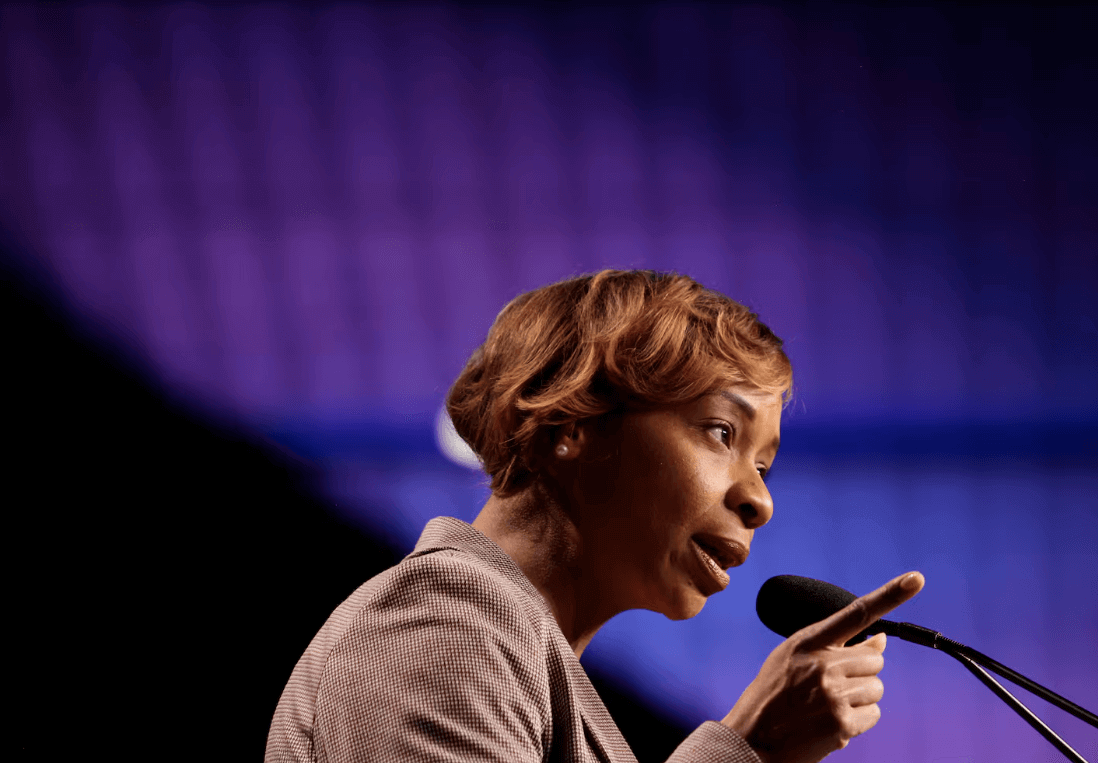马萨诸塞州总检察长坎贝尔起诉 TikTok,指控该平台“导致青少年心理健康危机”

【中美创新时报2024 年 10 月 9 日编译讯】(记者温友平编译)马萨诸塞州与其他十几个州和华盛顿特区一起起诉该公司,声称该平台旨在让人上瘾。《波士顿环球报》记者Anjali Huynh对此作了下述报道。
马萨诸塞州总检察长安德里亚·坎贝尔周二宣布,她对 TikTok 提起诉讼,与十几位总检察长一起声称该社交媒体平台的所有者故意将其设计为对年轻人有害的上瘾,同时欺骗公众健康风险。
这些诉讼由双方的 14 名总检察长分别提起,此时 TikTok 近年来作为娱乐和新闻来源而大受欢迎。
皮尤研究中心的数据显示,该平台越来越多地被用作政治工具,包括两次总统竞选,因为超过 60% 的青少年和 30 岁以下的成年人都表示使用该平台。但它也遭到了希望削弱其影响力的政客的强烈反对,主要是因为担心该平台归一家名为字节跳动的中国公司所有。
坎贝尔的办公室表示,马萨诸塞州的诉讼是一份长达 109 页的诉状,提交给了萨福克郡高等法院,指控 TikTok 违反了该州的消费者保护法,并“导致马萨诸塞州数十万用户的青少年心理健康危机”。

她的办公室声称 TikTok 有数据证实“过度和强迫性使用会导致精神和身体伤害”。尽管如此,它表示 TikTok“部署了‘强制性’设计功能,旨在吸引年轻人在其平台上花费尽可能多的时间……这对他们不利”,通常是在深夜。
坎贝尔在一份声明中表示:“马萨诸塞州不会容忍未来公司利用年轻人的弱点牟利。”
与全国其他诉讼类似,坎贝尔的办公室批评了TikTok定制算法的某些元素,例如其“自动播放”和“无限滚动”功能,这些功能允许用户在“为你推荐”的页面上看到源源不断的定制内容。
TikTok发言人迈克尔·休斯反驳了总检察长对该平台的描述,他指出该平台为年轻用户实施了“强有力的保障措施”,例如针对16岁以下未成年人的隐私设置。
休斯说:“我们强烈反对这些说法,我们认为其中许多说法是不准确和误导的。我们为保护青少年所做的工作感到自豪,并将继续坚定地致力于这项工作,我们将继续更新和改进我们的产品。”
他补充道:“我们努力与总检察长合作了两年多,但他们选择采取这一步骤,而不是与我们共同努力,为整个行业的挑战寻找建设性的解决方案,这令人非常失望。”
这些诉讼是政客们最近为抵制这个流行的社交媒体平台而采取的一系列行动中的最新一次,这些行动往往与对中国可能影响内容的看法有关。除了马萨诸塞州,全国大多数州都禁止在政府发放的设备上使用该应用程序。
今年早些时候,拜登政府签署了国会通过的一项法律,该法律可以有效地禁止该平台在美国使用,除非将其出售给另一家公司。该法律目前正受到法院的审理,并引发了公众的强烈抗议。
卫生专业人士也对其使用表示担忧。2023 年,美国卫生局局长维韦克·穆尔蒂公开表示担心社交媒体的使用可能会损害 18 岁以下人群的心理健康,导致抑郁、焦虑和睡眠不佳等症状。
尽管如此,这并没有阻止候选人和民选官员使用该平台。例如,副总统卡马拉·哈里斯和前总统唐纳德·特朗普在 Facebook 上都拥有数百万粉丝,因为他们的竞选活动已将其用于媒体策略中,以加强他们可能无法在其他地方接触到的选民的支持。
该应用上的政治内容激增,尤其是越来越多的 30 岁以下用户更有可能表示他们从该平台获取新闻。
去年秋天,坎贝尔在萨福克郡高等法院对运营 Facebook 的集团 Meta Platforms Inc. 和该平台的子公司 Instagram 提起了类似的诉讼。
她的工作以州长莫拉·希利 (Maura Healey) 的工作为基础,后者于 2022 年以司法部长的身份领导了另一个由两党组成的全国总检察长小组,调查 TikTok 的运营方式是否“导致或加剧身心健康危害”。
周二宣布的诉讼由纽约和加利福尼亚州的总检察长牵头,伊利诺伊州、肯塔基州、路易斯安那州、密西西比州、北卡罗来纳州、新泽西州、俄勒冈州、南卡罗来纳州、佛蒙特州、华盛顿州和华盛顿特区也提起了诉讼。
题图:马萨诸塞州总检察长安德里亚·坎贝尔杰西卡·里纳尔迪/Globe 工作人员
附原英文报道:
Mass. AG Campbell sues TikTok, alleging platform ‘contributed to a youth mental health crisis’
Massachusetts joined a dozen other states and Washington, D.C., in suing the company, claiming the platform is designed to be addictive
By Anjali Huynh Globe Staff,Updated October 8, 2024
Massachusetts Attorney General Andrea CampbellJessica Rinaldi/Globe Staff
Massachusetts Attorney General Andrea Campbell on Tuesday announced she filed a lawsuit against TikTok, joining more than a dozen attorneys general in claiming the social media platform’s owners intentionally designed it to be harmfully addictive for young people while deceiving the public of health risks.
The suits, which were filed individually by 14 attorneys general from both parties, come as TikTok has exploded in popularity in recent years as both a source of entertainment and news.
The platform has increasingly been used as a political tool, including by both presidential campaigns, as more than 60 percent of teens and adults under 30 report using the platform, according to the Pew Research Center. But it has also seen backlash from politicians looking to curtail its influence, primarily over concerns about its ownership by a Chinese company called ByteDance.
Campbell’s office said the Massachusetts iteration of the lawsuit, a 109-page complaint filed in Suffolk Superior Court, alleges TikTok had violated the state’s consumer protection laws and “contributed to a youth mental health crisis” among hundreds of thousands of users in Massachusetts.
Her office claimed TikTok had data confirming “the mental and physical harms associated with excessive and compulsive use.” Despite that, TikTok, it said, “deployed ‘coercive’ design features intended to hook youth into spending as much time as possible on its platform … to their detriment,” often late at night.
“Massachusetts will not tolerate a future where companies exploit the vulnerabilities of young people for profit,” Campbell said in a statement.
Similar to other lawsuits around the country, Campbell’s office criticized elements of TikTok’s tailored algorithm, such as its “autoplay” and “infinite scroll” features, that allow users to see an endless stream of tailored content on a “for you” page.
Michael Hughes, a TikTok spokesperson, pushed back on characterizations of the platform from the attorneys general, pointing to “robust safeguards” he said the platform implemented for younger users such as its privacy settings for minors under 16.
“We strongly disagree with these claims, many of which we believe to be inaccurate and misleading. We’re proud of and remain deeply committed to the work we’ve done to protect teens, and we will continue to update and improve our product,” Hughes said.
He added: “We’ve endeavored to work with the Attorneys General for over two years, and it is incredibly disappointing they have taken this step rather than work with us on constructive solutions to industrywide challenges.”
The lawsuits mark the latest in a string of recent actions politicians have taken to push back on the popular social media platform, often tied to concerns about the perception that China could influence content. The app is banned from being used on government-issued devices in a majority of states around the country, though not in Massachusetts.
Earlier this year, the Biden administration signed a law passed by Congress that could effectively ban the platform in the United States unless it was sold to another company. That law is currently tied up in the courts and sparked significant public outcry.
Health professionals, too, have voiced concerns about its use. In 2023, Vivek Murthy, the US surgeon general, publicly expressed concerns that social media usage could harm the mental health of those under 18, contributing to conditions such as depression, anxiety, and poor sleep.
Still, that has not stopped candidates and elected officials from using the platform. Both Vice President Kamala Harris and former president Donald Trump, for example, have millions of followers apiece there, as their campaigns have employed it in their media strategies to bolster support among voters they might not be able to reach elsewhere.
Political content has proliferated on the app, and an increasing number of users under 30, in particular, are more likely to say they get their news from the platform.
Campbell filed a similar lawsuit last fall against Meta Platforms Inc., the group that operates Facebook, and Instagram, a subsidiary of the platform, in Suffolk Superior Court.
Her work built on that of Governor Maura Healey, who in 2022, as attorney general, led another bipartisan group of attorneys general around the country in investigating whether TikTok was operating “in a manner that causes or exacerbates physical and mental health harms.”
The lawsuits announced Tuesday were led by attorneys general from New York and California and were also filed in Illinois, Kentucky, Louisiana, Mississippi, North Carolina, New Jersey, Oregon, South Carolina, Vermont, Washington state, and Washington, D.C.

